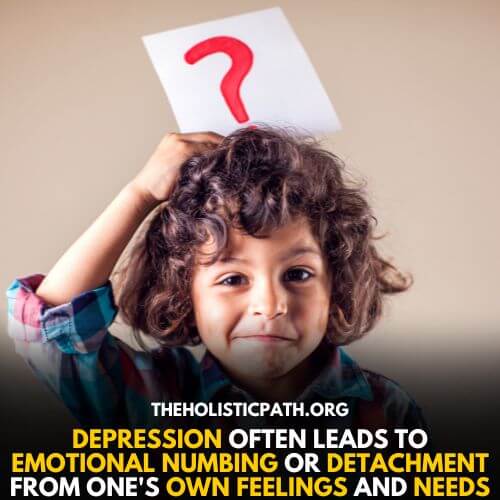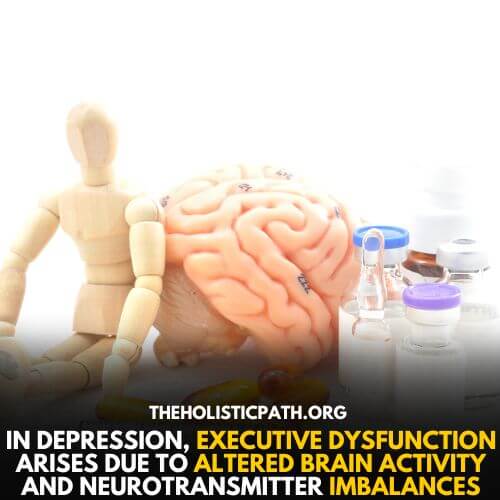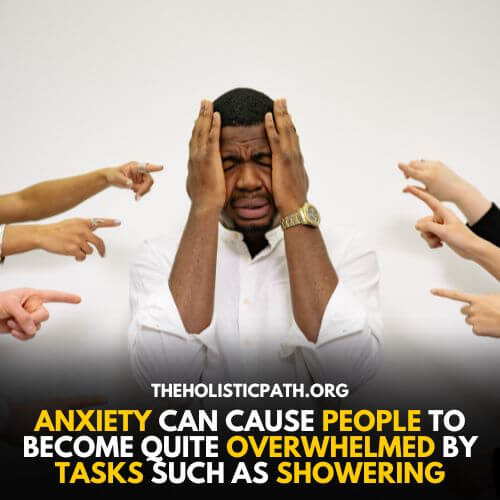As we go about our daily lives, personal hygiene routines often become second nature—a part of our overall well-being. Yet, there are instances when individuals might find themselves grappling with a lack of motivation to tend to these routines, specifically showering. While a variety of factors can contribute to such situations, one intriguing question emerges: Is not showering a sign of depression?
Diving into this query necessitates an exploration of the intricate interplay between mental states and daily habits. This article delves into the nuanced relationship between personal hygiene and mental health, aiming to unravel whether irregular showering habits could potentially serve as indicators of underlying depression. By deciphering the potential signs and delving into the broader context, we seek to foster a deeper understanding of how these outward behaviors might offer insight into one’s inner emotional landscape.
Is Not Showering a Sign of Depression – 10 Formidable Reasons
Personal hygiene practices, including regular showering, are often considered routine and automatic components of daily life. However, when an individual consistently neglects these habits, questions regarding their underlying mental and emotional state naturally arise.
While there is no singular answer to whether not showering is a definitive sign of depression, there exists a complex interplay between mental health and personal care behaviors. Here are 10 reasons why depression makes it hard to shower:
1. Low Energy Levels: The Weight of Lethargy
One of the hallmark symptoms of depression is an overwhelming sense of fatigue and low energy. Individuals grappling with this mental health condition often find even the most basic tasks to be taxing and draining.
As a result, activities that were once routine, such as showering, can feel like insurmountable feats. The profound lethargy experienced by those with depression can manifest as a significant barrier, rendering the act of showering a mentally and physically exhausting endeavor.
2. Cognitive Impairment: The Fog of the Mind
Depression frequently accompanies cognitive impairments, including difficulties with concentration, memory, and decision-making. This cognitive fog can have a direct impact on an individual’s motivation and ability to engage in self-care activities.
The task of preparing for and taking a shower requires a certain level of cognitive functioning, from selecting appropriate clothing to organizing steps in the bathing process. For someone battling depression, these seemingly simple cognitive processes may pose considerable challenges, further contributing to a lack of motivation to shower.
3. Emotional Numbness: Disconnect from Self-Care
Depression often leads to emotional numbing or detachment from one’s own feelings and needs. Engaging in self-care routines like showering requires a degree of emotional investment and awareness of one’s well-being. However, the emotional disconnect experienced by individuals with depression can hinder their ability to recognize and respond to these self-care needs.

The notion of taking care of oneself might feel distant or even irrelevant, amplifying the likelihood of neglecting personal hygiene.
This emotional detachment can perpetuate a cycle where the lack of self-care reinforces the existing emotional disconnect, making it challenging to break away from this pattern without compassionate support and targeted intervention.
4. Inability to Focus
For those struggling with depression, it can be difficult to focus on tasks such as showering due to negative thoughts and feelings, lack of energy and motivation, and difficulty concentrating. This can make it hard to remember to shower on a regular basis or even complete the task once it is started. Here are some common ways in which depression can affect one’s ability to focus while showering:
- Negative thoughts and feelings about oneself that interfere with concentration
- Difficulty focusing on tasks such as showering due to lack of pleasure from activities
- The agitation makes it hard to settle into a routine such as showering.
5. Loss of Interest: Anhedonia’s Influence
Anhedonia, the inability to experience pleasure or interest in activities once enjoyed, is a prevalent symptom of depression. Hobbies, social interactions, and even daily routines can lose their appeal.
Showering, typically viewed as a refreshing and invigorating experience, can be stripped of its pleasurable aspects for someone dealing with anhedonia. The absence of joy or interest in the act of showering can lead to avoidance and neglect of this otherwise beneficial activity.
6. Distorted Body Image: When Perception Takes a Toll
Depression can distort an individual’s perception of themselves, often leading to a negative self-image and low self-esteem. The simple act of disrobing for a shower can trigger feelings of shame, discomfort, and self-critique in those grappling with distorted body image.
The vulnerability of being undressed can exacerbate these feelings, causing avoidance of the showering process altogether.
Such avoidance stems from a profound fear of confronting these negative body perceptions head-on, resulting in a reinforcing loop where the perceived discomfort outweighs the benefits of self-care. As a result, those battling depression might find themselves caught between the desire for personal hygiene and the emotional challenges their distorted self-perception brings forth.
7. Overwhelming Anxiety: Fear of the Routine
While anxiety and depression are distinct conditions, they frequently coexist, intensifying each other’s effects. Anxiety, in particular, can manifest as overwhelming fear or apprehension about even seemingly mundane tasks.
The prospect of stepping into the shower might trigger anxiety related to the process itself, the water, or even the potential for slipping. This fear can serve as a significant deterrent, leading to avoidance of showering.
8. Social Isolation: The Pulling Away
Depression often prompts individuals to withdraw from social interactions and isolate themselves. Personal hygiene routines, including showering, are closely tied to social functioning. The act of showering might feel futile if one perceives a lack of external engagement or connection with others.
Social isolation can diminish the perceived importance of maintaining personal hygiene, further contributing to neglect.
This isolation not only erodes the motivation to engage in self-care but can also reinforce the belief that personal grooming matters less when one is disconnected from social circles. Consequently, the neglect of showering becomes intertwined with a broader sense of detachment from both oneself and the world, perpetuating a cycle of neglect.
9. Overwhelming Guilt and Shame: Emotional Burden
Depression is frequently accompanied by intense feelings of guilt, shame, and self-blame. These emotions can create a vicious cycle, where neglecting personal care routines like showering reinforces negative self-perceptions, leading to increased guilt. The emotional weight of these feelings can be paralyzing, making it difficult to initiate or sustain hygiene habits.
This self-imposed guilt can further erode an individual’s sense of self-worth, exacerbating the reluctance to engage in activities that would typically promote well-being and self-care. As these negative emotions entwine with the avoidance of self-care tasks, such as showering, individuals may find themselves trapped in a cycle that’s challenging to break free from without adequate support and understanding.
10. Side Effects of Medication
For those taking medication for depression, side effects such as drowsiness and fatigue can make it difficult to shower. Here are some of the ways that side effects of medication can make it difficult to shower:
- Drowsiness or fatigue which makes it hard to remember or initiate a shower
- Muscle weakness resulting in difficulty standing for long periods of time while showering
- Nausea or dizziness while taking a shower during the depression
- Difficulty concentrating on the task due to lack of energy and motivation.
- Reduced coordination can make it hard to properly use soap, shampoo, and other products.
In examining the potential reasons behind irregular showering habits in individuals with depression, it becomes evident that the relationship between mental health and personal care is multifaceted. These interconnected factors shed light on the complexities of the issue and emphasize the importance of recognizing the signs of depression, fostering empathy, and offering support to those who may be struggling.
Executive Dysfunction in Depression: A Hurdle to Showering
Executive dysfunction refers to the impaired ability to plan, initiate, organize, and complete tasks effectively. This cognitive impairment is commonly experienced by individuals with depression and can significantly impact various aspects of daily life, including personal hygiene routines like showering. Understanding how executive dysfunction operates in the context of depression can shed light on why showering might become a challenge for those struggling with this mental health condition.

In depression, executive dysfunction arises due to altered brain activity and neurotransmitter imbalances. This can result in several specific challenges that affect the showering process:
- Initiation and Motivation: Individuals with depression often struggle to initiate activities, even ones they know are necessary for their well-being. Showering requires the motivation to start the process, and executive dysfunction can make it challenging to gather the mental energy required to get off the couch, step into the bathroom, and start the water.
- Task Organization: Showering involves a sequence of steps that need to be executed in a specific order. Executive dysfunction can disrupt the ability to organize these steps, making it difficult to remember the order in which tasks need to be performed. This can lead to confusion and frustration during the shower, as the person may forget whether they’ve shampooed their hair or used soap.
- Time Management: Depression often distorts one’s sense of time, leading to difficulties in estimating how long tasks will take. This can make the idea of spending 15-20 minutes in the shower feel like an eternity, further diminishing the motivation to start the process.
- Decision-Making: Choosing which products to use, adjusting water temperature, and deciding when the shower is complete all require decision-making. Executive dysfunction can impair this aspect, making these seemingly simple choices feel overwhelming and paralyzing.
- Sustained Attention: Staying focused on the task at hand, such as thoroughly cleaning the body and hair, can be challenging when executive dysfunction is present. The mind might wander, and the person may find themselves lost in their thoughts, unaware that they haven’t completed the necessary steps.
- Self-Care Prioritization: Depression often leads to a diminished sense of self-worth and importance. This can result in lowered motivation to engage in self-care activities like showering. Executive dysfunction exacerbates this by making it difficult to prioritize self-care needs over other distractions or activities that might provide temporary relief from emotional distress.
While the act of showering itself might seem straightforward, the underlying cognitive processes needed to accomplish it can be disrupted by depression-related executive dysfunction. Recognizing this challenge is crucial for both individuals with depression and their support systems, as it highlights the need for understanding, patience, and tailored strategies to overcome these obstacles and prioritize self-care.
Role of 4 Other Mental Disorders in Poor Hygiene
Mental health disorders such as anxiety, bipolar disorder, schizophrenia, and post-traumatic stress disorder can all contribute to poor hygiene. Here is a breakdown of how these conditions can affect one’s ability to take care of their personal hygiene:
1. Anxiety
Anxiety can cause people to become overwhelmed by tasks such as showering. Here are some ways that anxiety can affect one’s ability to take care of hygiene:
- Feelings of intense fear or panic can make it difficult to focus on tasks like showering
- Inability to stay focused due to racing thoughts and worries
- Difficulty motivating oneself due to fear of judgement or criticism.
2. Bipolar Disorder
Bipolar disorder can make people struggle with regulating their emotions, which can make it difficult to take care of hygiene. Here are some ways that bipolar disorder can affect one’s ability to take care of hygiene:
- Problems with regulating mood and energy levels can make it hard to stay motivated
- Inability to focus or concentrate on the task at hand due to racing thoughts
- Difficulty planning or completing simple tasks like showering.
3. Schizophrenia
Schizophrenia can result in making people struggle with confusion or disorganization, which can make it difficult to take care of hygiene. Here are some ways that schizophrenia can affect one’s ability to take care of hygiene:
- Delusions, paranoia, and disorganization of thought processes make it hard to focus
- Difficulty staying motivated due to lack of energy or motivation
- Fear of judgement can make it difficult to be in the bathroom while showering.
4. Post-Traumatic Stress Disorder
Post-traumatic stress disorder can result in people struggling with intrusive memories, which can make it difficult to take care of hygiene. Here are some ways that post-traumatic stress disorder can affect one’s ability to take care of hygiene:
- Anxiety, flashbacks and nightmares can cause difficulty focusing on tasks like showering
- Inability to stay motivated due to fear of the environment or past experiences
- Lack of trust in oneself can lead to procrastination or avoidance.
By recognizing these issues and seeking appropriate treatment, individuals can begin to manage the symptoms of their mental health disorder, which may improve their ability to take care of their personal hygiene. People can take steps towards better self-care and improved overall well-being with the right support.

7 Effective Coping Strategies for Personal Hygiene During Depression
Maintaining personal hygiene can become a significant challenge for individuals experiencing depression. The combination of low energy, lack of motivation, and cognitive difficulties can make self-care routines, such as showering, feel overwhelming.
However, implementing coping strategies tailored to the unique needs of those dealing with depression can help alleviate the burden and make personal hygiene more manageable. Here, we delve into seven effective coping strategies in detail, offering practical insights into how to implement them:
1. Establish a Routine:
Establishing a consistent daily routine can provide a sense of predictability and stability amidst the unpredictable nature of depression. Plan specific times for showering and incorporate them into your schedule, ideally during moments when your energy levels tend to be higher.
By making showering a regular part of your routine, it becomes an expected task rather than an unpredictable challenge. You can set alarms or reminders to prompt you, gradually building the habit of showering at the same times each day.
2. Break It Down:
Depression often makes tasks feel overwhelming. Breaking down the task of showering into smaller, more manageable steps can make the process less intimidating. Focus on accomplishing one step at a time.
Begin by gathering your towel and toiletries, adjusting the water temperature, or shampooing your hair. This approach reduces the overwhelming nature of the entire process and provides a sense of accomplishment as you complete each step.
3. Simplify the Environment:
Depression can make even simple decisions feel burdensome. To ease this cognitive load, streamline your showering environment. Lay out the necessary items in advance, such as soap, shampoo, and a towel.
Consider using all-in-one products or pre-filled dispensers to reduce the number of choices you need to make during the shower. A clutter-free and organized space can make the process less mentally taxing and more inviting.
4. Practice Mindfulness:
Mindfulness techniques can help you stay present in the moment while showering, reducing the tendency for your thoughts to spiral into negative patterns. As you shower, focus on the sensations of the water on your skin, the scent of the soap, and the sound of the water.
Mindfulness can help reduce feelings of being overwhelmed and anxious, making the showering experience more enjoyable and less daunting.
5. Set Realistic Goals:
Depression can make you feel like you’re constantly falling short of expectations. Combat this by setting achievable goals for yourself and celebrating each accomplishment.
Instead of aiming for a long, thorough shower, start with shorter showers and gradually increase the duration as you feel more comfortable. Acknowledge your efforts and celebrate the fact that you took steps towards self-care, regardless of the duration.
Every small step matters.
6. Enlist Support:
Depression can isolate you, but reaching out for support is essential. Let friends, family, or a therapist know about your struggles with maintaining personal hygiene and ask for their encouragement.
Having someone check in on you, provide gentle reminders, or even shower with you (if comfortable) can make the process feel less isolating. Sharing your challenges and successes can create a support system that eases the journey.
7. Practice Self-Compassion:
Cultivate self-compassion by treating yourself with understanding and kindness. Recognize that depression can make even simple tasks challenging, and that’s okay.
Be patient with yourself on days when showering feels difficult, and avoid self-criticism.
Remember that taking small steps towards self-care is an achievement in itself. Treat yourself as you would a close friend, offering encouragement and understanding during challenging times.
Incorporating these detailed coping strategies into your routine can significantly ease the challenges of maintaining personal hygiene during depression. Remember that progress might be gradual, and setbacks are natural. By practicing patience, self-compassion, and a willingness to adapt these strategies as needed, you can make personal hygiene a more manageable and less overwhelming part of your journey toward mental well-being.
Conclusion
Good personal hygiene is an important part of self-care and well-being. Mental health disorders can affect one’s ability to take care of their own hygiene. But with proper understanding, support and strategies in place, individuals can find ways to manage the symptoms of their disorder and make it easier to take care of themselves.
With the right resources and encouragement, people can work towards better personal hygiene and improved overall well-being.
References:
Yasuaki Goto (June 7, 2018). Physical and Mental Effects of Bathing: A Randomized Intervention Study. https://www.ncbi.nlm.nih.gov/pmc/articles/PMC6011066/
Akemi Furuyashiki (June 22, 2019). A comparative study of the physiological and psychological effects of forest bathing (Shinrin-yoku) on working-age people with and without depressive tendencies. https://environhealthprevmed.biomedcentral.com/articles/10.1186/s12199-019-0800-1
Santosh K. Chaturvedi (November 9, 2017). ‘Take a Bath’ in Mental Health Rehabilitation: The Hidden Psychobathology. https://link.springer.com/article/10.1007/s40737-017-0103-z
